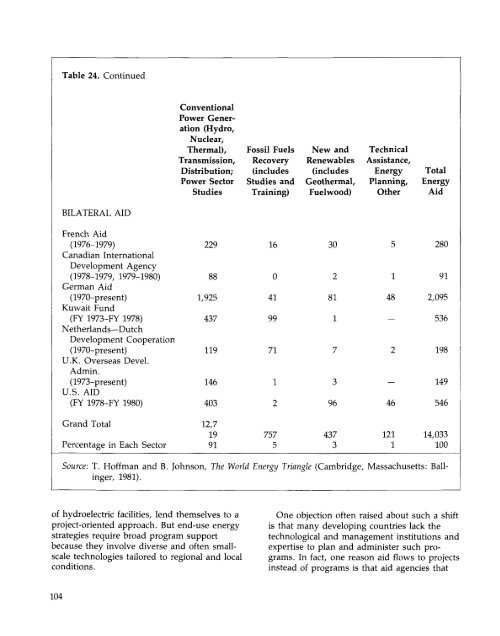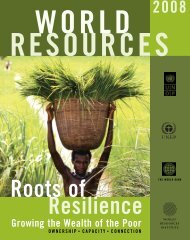ENERGY FOR A SUSTAINABLE WORLD - World Resources Institute
ENERGY FOR A SUSTAINABLE WORLD - World Resources Institute
ENERGY FOR A SUSTAINABLE WORLD - World Resources Institute
Create successful ePaper yourself
Turn your PDF publications into a flip-book with our unique Google optimized e-Paper software.
Table 24. Continued<br />
Conventional<br />
Power Generation<br />
(Hydro,<br />
Nuclear,<br />
Thermal),<br />
Transmission,<br />
Distribution;<br />
Power Sector<br />
Studies<br />
Fossil Fuels<br />
Recovery<br />
(includes<br />
Studies and<br />
Training)<br />
New and<br />
Renewables<br />
(includes<br />
Geothermal,<br />
Fuelwood)<br />
Technical<br />
Assistance,<br />
Energy<br />
Planning,<br />
Other<br />
Total<br />
Energy<br />
Aid<br />
BILATERAL AID<br />
French Aid<br />
(1976-1979)<br />
Canadian International<br />
Development Agency<br />
(1978-1979, 1979-1980)<br />
German Aid<br />
(1970-present)<br />
Kuwait Fund<br />
(FY 1973-FY 1978)<br />
Netherlands—Dutch<br />
Development Cooperation<br />
(1970-present)<br />
U.K. Overseas Devel.<br />
Admin.<br />
(1973-present)<br />
U.S. AID<br />
(FY 1978-FY 1980)<br />
229<br />
88<br />
1,925<br />
437<br />
119<br />
146<br />
403<br />
16<br />
0<br />
41<br />
99<br />
71<br />
1<br />
2<br />
30<br />
2<br />
81<br />
1<br />
7<br />
3<br />
96<br />
5<br />
1<br />
48<br />
—<br />
2<br />
—<br />
46<br />
280<br />
91<br />
2,095<br />
536<br />
198<br />
149<br />
546<br />
Grand Total<br />
Percentage in Each Sector<br />
12,7<br />
19<br />
91<br />
757<br />
5<br />
437<br />
3<br />
121<br />
1<br />
14,033<br />
100<br />
Source: T. Hoffman and B.<br />
inger, 1981).<br />
fohnson, The <strong>World</strong> Energy Triangle (Cambridge, Massachusetts: Ballof<br />
hydroelectric facilities, lend themselves to a<br />
project-oriented approach. But end-use energy<br />
strategies require broad program support<br />
because they involve diverse and often smallscale<br />
technologies tailored to regional and local<br />
conditions.<br />
One objection often raised about such a shift<br />
is that many developing countries lack the<br />
technological and management institutions and<br />
expertise to plan and administer such programs.<br />
In fact, one reason aid flows to projects<br />
instead of programs is that aid agencies that<br />
104

















